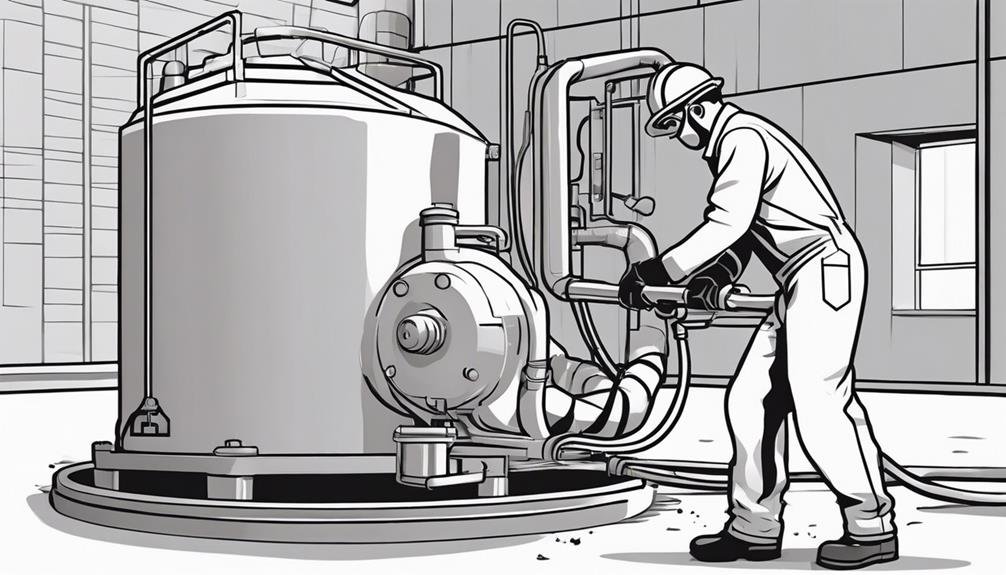Are you aware of the silent issues lurking in your septic tank? Ignoring maintenance can lead to costly repairs, but fear not; there's a solution.
Discover the key steps to ensuring your septic system runs smoothly and efficiently. From recognizing warning signs to understanding the best pumping techniques, this guide will equip you with the knowledge needed to maintain your septic tank effectively.
Stay tuned for valuable tips that could save you time, money, and headaches in the long run.
Key Takeaways
- Regular maintenance prevents costly repairs and ensures a healthy ecosystem.
- Signs like odors, slow drains, and pooling water indicate the need for cleaning.
- Professional pumping techniques effectively remove sludge and prevent system failures.
- Cost-effective tips and smart strategies extend the septic tank's lifespan and maintain optimal functionality.
Importance of Regular Maintenance

Regular maintenance of your septic tank is crucial to ensure its proper functioning and longevity. By taking preventive measures through routine checks and timely cleanings, you can avoid costly repairs and potential environmental impact. Regular inspections help in identifying any issues early on, preventing major problems that could lead to contamination of the surrounding soil and water sources.
Ensuring that your septic tank is well-maintained not only protects your property but also safeguards the environment. Neglecting maintenance can result in leaks, blockages, or even system failures, posing a risk to groundwater quality and public health. By staying proactive and following a maintenance schedule, you contribute to a cleaner and healthier ecosystem.
Implementing regular maintenance practices, such as monitoring water usage, being mindful of what goes down the drains, and scheduling professional inspections, can significantly extend the lifespan of your septic tank. Remember, taking care of your septic system today means a smoother and more sustainable tomorrow.
Signs Your Tank Needs Cleaning
If you notice foul odors lingering around your property, it may be a clear indication that your septic tank requires cleaning. Neglecting regular maintenance can lead to a buildup of sludge and scum, causing your tank to emit unpleasant smells.
Here are some warning signs that your septic tank needs cleaning:
- Slow Drains: If you experience slow drainage in sinks, showers, or toilets, it could signal a full septic tank.
- Pooling Water: Puddles of water forming around the drain field or above the septic tank indicate a potential issue.
- Lush Grass: While it may seem healthy, unusually lush and green grass above the septic tank could mean excess water and nutrients are leaching out.
- Gurgling Sounds: Strange gurgling noises coming from the drains may indicate a blockage or full tank.
If you notice any of these signs, it's essential to address the problem promptly. While some DIY solutions like using bacterial additives or avoiding harsh chemicals can help temporarily, professional septic tank cleaning services are often necessary for a thorough maintenance job.
Professional Pumping Techniques

To ensure a thorough maintenance job for your septic tank, understanding the professional pumping techniques employed is crucial for effective cleaning and upkeep. Professional septic tank cleaning services utilize advanced technology and efficient methods to pump out the accumulated sludge and scum in your tank.
One common technique involves using high-powered vacuum trucks equipped with robust pumps to suction out the waste material from the tank. These trucks can efficiently remove large volumes of sludge and liquid waste, ensuring a comprehensive cleaning process.
Moreover, professionals may employ specialized tools to agitate the contents of the tank, helping to break up solidified waste for easier removal. By utilizing these advanced techniques, septic tank cleaning experts can ensure that your tank is thoroughly cleaned and maintained, reducing the risk of backups or system failures.
Cost-Effective Maintenance Tips
For cost-effective maintenance of your septic tank, consider implementing smart strategies to prolong its efficiency and avoid unnecessary expenses. Here are some tips to help you keep your septic system running smoothly without breaking the bank:
- Regular Inspections: Conduct routine inspections to catch any issues early on before they escalate and require costly repairs.
- Proper Waste Disposal: Be mindful of what goes down your drains to prevent clogs and damage to your septic system.
- DIY Solutions: Learn how to perform basic maintenance tasks yourself, such as checking for leaks or ensuring proper ventilation.
- Eco-Friendly Products: Opt for environmentally friendly cleaning products to maintain a healthy balance of bacteria in your septic tank without harming the environment.
Frequently Asked Questions
How Often Should I Have My Septic Tank Inspected for Potential Issues?
You should have your septic tank inspected every 1-3 years to catch potential issues early. Signs of trouble include slow drains, foul odors, or pooling water. Regular inspections can prevent costly repairs and ensure your system functions smoothly.
Can I Use Additives or Chemicals to Maintain My Septic Tank Instead of Regular Pumping?
You might be tempted to use additives or chemicals for your septic tank, but they can harm the environment and may not be as effective as regular pumping. Consider the long-term cost comparison before deciding.
What Are Some Common Reasons for Septic Tank Failures?
For septic tank maintenance, common reasons for failures include neglecting regular pumping, flushing non-biodegradable items, tree root intrusions, and soil compaction. Signs of failure are slow drains, foul odors, and pooling water in the yard.
Is It Safe to Plant Trees or Build Structures Near My Septic Tank?
When it comes to your septic tank, planting trees or building too close can be like inviting trouble for dinner. Tree roots can infiltrate and cause risks, while structures nearby may lead to structural damage and dangers.
How Can I Prevent Clogs and Backups in My Septic System?
To prevent clogs and backups in your septic system, focus on septic system landscaping to avoid planting trees or building near it. Regular DIY septic maintenance, like pumping every 3-5 years, using septic-safe products, and monitoring water usage, helps maintain system health.
Conclusion
In conclusion, keeping up with regular septic tank maintenance is crucial to avoid costly repairs and ensure your system operates smoothly. By recognizing the signs that your tank needs cleaning and utilizing professional pumping techniques, you can maintain a healthy and efficient septic system.
Remember, like a well-oiled machine, your septic tank requires regular care and attention to keep everything running smoothly. Stay proactive and stay ahead of any potential issues that may arise.

